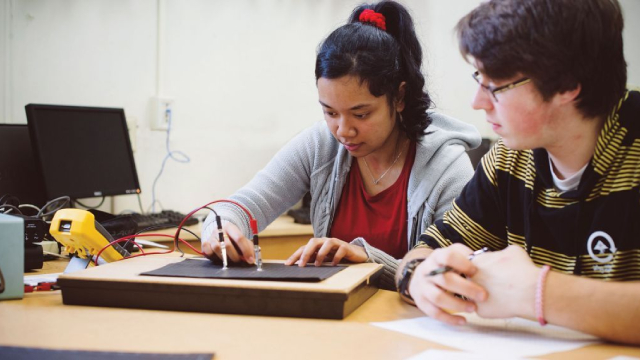Undergraduate Study
Physics is a fun and rewarding topic that is full of deep ideas and fascinating concepts. One of the great joys in physics is seeing how a simple principle, established after studying one problem, can go on to explain seemingly unrelated phenomena. Studying physics also develops analytical, practical and IT skills and leads to great employment opportunities in many sectors. Undergraduates are the core of our department and we are proud that levels of student satisfaction and achievement are high for our students. We encourage you to look at the independent evaluations, which are available from discoveruni. Read on to find out more about our Physics, Maths and Physics, Physics with Astrophysics and Physics with Business and Management courses.
James Lloyd-Hughes, Admissions Tutor

Discover our undergraduate programmes




Why study Physics at Warwick?
Your Tutor will be an expert in the field and will support you and develop your skills throughout your degree.
Our Teaching and Research Facilities are outstanding and will be at the heart of your experience with us.
Our students thrive within our collaborative and welcoming academic environment, and achieve great things!
Our Offer and Entry Requirements
For Physics courses our standard offer for entry is A*AA at A level, to include Physics, Maths and a third subject. For Maths and Physics we ask for an A* in Maths, A in Physics and A in Further Maths; alternatively A* Maths, A* Physics, A third subject. For full details, including offers for other qualifications, see here.


Our Graduates
Our graduates go on to a variety of careers or further study. Hear from our recent graduates about how studying Physics at the University of Warwick helped shape their career paths.
Find out more
Open Days
We run open days in June and October to help you decide whether to apply. If you receive an offer, you will be invited to our Offer Holder Open Days from December onwards for a chance to learn more about the course.
Online Live Chats
Can't make it in-person? Chat online with our Physics students and staff to answer your questions about our undergraduate courses.
Our next online event is Wednesday 10th December, 4pm.
Course Handbook
At Warwick our modular degrees allow you to tailor your degree to your interests. See exactly what our current students are studying at the Course HandbookLink opens in a new window, or check out the full list of modulesLink opens in a new window on offer.
How to apply
Learn about our application process for Undergraduate study at Warwick. Or check out our Life at Warwick pages to learn more about what studying here is like.
Fees and Funding
Discover the various methods to fund your study, alongside scholarship and bursary funds you may be eligible for.
General Enquiries
Admissions Secretary
E: physicsadmissions@warwick.ac.uk
T: +44 (0)24 765 74768
Prof. James Lloyd-Hughes,
Admissions Tutor
E: j.lloyd-hughes@warwick.ac.uk

